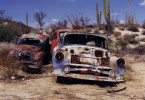It’s funny how sometimes we disqualify ourselves from even discussing a subject because we don’t think we know enough about it. What’s even funnier is how the people who profess to know so much about said subject often turn out to be pretty clueless.
Take “The Economy.” My distaste for the topic dates back to High School when I had to learn all the formulas and equations that define capitalism, and they never made much sense to me. Similar to literature class, where we had to dissect other people’s writings rather than develop our own creative style, I lost interest because the way things were presented it seemed that economic discourse was only meant for those who could follow the program.
But what if the whole program is based on false assumptions, and the people who push it aren’t any smarter than we are? What if we all understand more about economy than we give ourselves credit for?
The whole idea of the “expert” is one of the concepts we imbibe from an early age. If we’re savvy enough and/or play the game right, we might become one at some point, but for the rest of us “The Economy” and a whole range of other specialized academic exercises have become far removed from our immediate reality and left in the hands of the “adults.”
Of course, it’s not all the big bad experts keeping us outside the gate. It’s also a matter of self-selection. Who wants to deal with things like money, investments, and products all the time? Most of us do the best with what we’ve got and spend as much of our time as possible hanging with friends, taking a hike, or playing the guitar. (insert your own non-stock market related favorite activities here).
Here’s the catch though: We are all part of economy, just as we are part of ecology, politics or spirit. We engage in them every day, whether we’re aware of it or not, not only by the things we buy or don’t buy, but by how we conduct “business” in our daily lives. A lot of our economic “values” are actually quite simple and basic, and most of us learn and mostly understand them at a preschool age: Did you give back the game you borrowed from your friend? Did you share dessert with your brother? Are you taking care of your new toy?
I know it sounds absurd but I think we could have a much healthier economy if we modeled it after what we teach our children. Take only what you need. Help those who have less. Clean up your mess. Here of course you can already see the broader strokes of these simple truisms, strokes that reach far beyond any categorized expert notion of “The Economy.” We’re talking about the principles of life itself, at least as far as our little planet and its finite resources are concerned. This is where economy meets ecology meets philosophy meets spirituality meets truth: You cannot take out more than you put back in. Everything is linked. Nothing disappears. As above, so below.
Amazing how “The Economy” all of a sudden becomes vibrant and interesting when liberated from the cages of spreadsheets and portfolios, rescued from linguistic black holes like default swaps, derivatives and commodities futures. There’s nothing as exulting on God’s great earth as to shine a light on the dirty secrets of capitalism. Take externalities. Such an innocuous little word, hidden somewhere deep in the back of the free market glossary, another word for all those pesky little things the purveyors of capitalistic lore have chopped from the economic equation: Pollution, waste, inequality, resource depletion, to name just a few.
It’s quite simple — we live on a little round ball with limited resources that are all connected to one another. The concept of eternal growth is a fantasy concocted in the brains of greedy or just small-minded currency crunchers. If you tap all the water to create wealth upstream, the land downstream will be dry and poor. If you burn fossil fuels that took millions of years to form in a matter of decades, you put yourself on a multi-million year payback schedule. If you have people making millions of dollars in interest and bonuses, they’re either manipulating the system or living off the hard work and value created by others. It doesn’t take an “Economist” to see this, only conscious citizens engaged in economy.
I am hopeful and optimistic that a more holistic approach to the way we humans conduct our trades and exchanges is on the horizon. While a lot of the same old linear thinking is still in place and being heeded, new roots are cracking the concrete. Articles such as Benjamin Barber’s A Revolution in Spirit in a recent issue of The Nation show that maybe, just maybe, a more creative and visionary approach to economy is taking hold:
Imagine all the things we could do without having to shop: play and pray, create and relate, read and walk, listen and procreate–make art, make friends, make homes, make love.
Sound too soft? Too idealistic? If we are to survive the collapse of the unsustainable consumer capitalism that has possessed our body politic over the past three decades, idealism must become the new realism. For if the contest is between the material body defined by solipsistic acquisitiveness and the human spirit defined by imagination and compassion, then a purely technical economic response is what will be too soft, promising little more than a restoration of that shopaholic hell of hyper-consumerism that occasioned the current disaster.
It’s time for the creative people of the world to reclaim the meaning and definitions of terms so closely guarded by the keepers of the gate. Time to take economic discourse to a higher level, making it part of our shared language, away from the towers of power. Time to replace profit and consumption with wisdom and imagination indexes, invest in soil and soul, value the Tao over the Dow. After all, the word Economy comes from the Greek word Oikos, meaning “one who manages a household.” Last I checked, we all live here, not just the fat cats.







